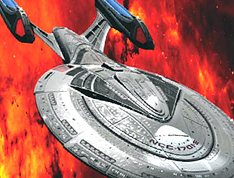I think this is where we, for me, draw the line between what makes for a good sense of realism and what makes for good television viewing.Actually I liked that about the show, that it was one of the only shows that tried to depict space battles realistically, with the ships too far apart to see more than one except in screen graphics, instead of copying Star Wars's WWII-dogfight version of space battles or The Wrath of Khan's Hornblower-sea-battle version, neither of which is remotely how a space battle would actually work. The only other modern show I can think of that portrays anything like realistic distances in space battles is The Expanse. (The original Star Trek ironically did it better than modern shows because it didn't have the FX capability to show two ships in the same shot most of the time.)
To the assertion that watching graphics on a screen can't be suspenseful, I offer the movie Fail Safe as a counterargument. The fact that the characters were watching a big wall display depicting events happening thousands of miles away beyond their ability to control was a key part of what created the suspense. Alfred Hitchcock and plenty of other filmmakers have always known that what you can't see is a great source of fear and tension.
Of course, having crewed fighters at all in Andromeda was unrealistic and a concession to the Star Wars WWII-pastiche paradigm, even though the slipfighters could function as drones remotely operated by Andromeda herself. Atomic Rockets has a good explanation of why space fighters make no sense: https://www.projectrho.com/public_html/rocket/fighter.php#id--Why_Fighters_Are_Worthless In short, there's no point wasting the fuel to propel the mass of a pilot and their cockpit and life support when a missile or drone could do the same job.
In their defense, IIRC I was also pretty tired at the time I was watching the episode, but I just found the approach they took in that episode to be very hard to follow. It felt like a kind of cheap way to save money by never showing what was actually occurring.
There were a handful of isolated moments in DS9 where they did kind of the same thing, illustrating someone firing weapons by showing them pushing the button, but not showing the action itself.
Is it fair to say that at times NuBSG did the same thing? If so, I'd say they executed it much better.




